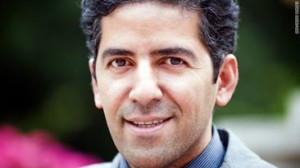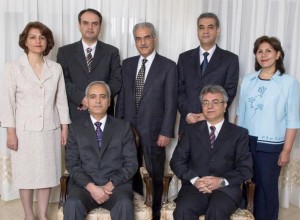[globalvoicesonline.org]

This guest post was written by Dr. Kamiar Alaei to commemorate the sixth anniversary of the imprisonment of the “Yaran”, seven leaders from the Baha’i, a persecuted minority in Iran. The Yaran – five men and two women – are serving 20 years in prison, the longest sentence of any prisoner of conscience in Iran. The author of this post and his brother Dr. Arash Alaei were imprisoned in 2008 while they were running public HIV/AIDS programs in Iran. The brothers shared cells with the Yaran men while behind bars.

I have much in common with the seven leaders of Iran’s Baha’i community who, on May 14, marked the end of their sixth year in prison. Like them, I was unjustly imprisoned. Like them, I was held in solitary confinement without charge. Like them, I was deprived of a fair trial. I even shared a cell with the male members of this group in prison. But I was eventually released and allowed to go free, while they are now facing another fourteen years behind bars.
My brother Arash and I are medical doctors. Several years ago, we began running public health programs to help HIV/AIDS patients, drug users and other vulnerable populations in Iran. These programs were gradually approved and funded by the Ministry of Health, but, following political changes, in 2008, with no explanation whatsoever, we were arrested and detained as a result of our work. I was picked up the day after Arash, and he didn’t even know I had been arrested until 2009, when we went to “trial.” This was a brief episode, lasting only a few hours. At the end of it, I was sentenced to three years and Arash to six years for our public health work, with the official charge being “communicating with an enemy government.”
Arash and I were then separated for several months, during which time we each became cellmates with male members of the “Yaran-i-Iran,” or Friends of Iran, the seven members of the ad hoc leadership group of the Baha’i community of Iran. Iran’s Baha’is are a minority religious community that have been heavily persecuted since the 1979 Revolution, and the Yaran appeared to be the latest victims of this persecution. Like us, they were arrested and detained in 2008, and, when we met the five men, they had just finished four months of solitary confinement, without any contact with their families.
I know how crushing solitary confinement can be. I had also been in solitary for the first 63 days of my imprisonment, and it felt like a sort of death. I found myself praying, reciting poems I had learned as a child, and recounting times I had helped patients. Those memories were a lifeline that raised my spirit, even inside that small prison cell. Upon meeting the Baha’is, I realized that they, too, had found ways to keep their spirits strong during their time in solitary, as they had no bitterness, and were always seeking to help those around them, despite the difficult and inhumane circumstances they were in.
During our time with them in Evin, I shared a cell with Behrouz Tavakkoli, Jamoloddin Khanjani, and Afif Naeimi, and Arash shared a cell with Saeid Rezaie and Vahid Tizfahm. We came to know them as some of the most decent, kind, and upstanding people we had ever met. Like the rest of Iran’s 300,000-person Baha’i community, they are law-abiding, non-violent, non-political people who seek to serve their communities and their country. We knew that, like us, they had been unjustly imprisoned and we hoped that they would soon be released.
Unfortunately, in 2010, the Yaran were sentenced to 20 years of imprisonment on charges including “espionage” and “corruption on earth.” Of course, they are innocent of these charges, and were convicted only because of religious prejudice on the part of some officials, but their 20-year sentences – among the longest sentence of any prisoners of conscience in Iran – were upheld on appeal.
Soon after, the male members of the Yaran were transferred to Rajai Shahr prison in Gohardasht, Iran. That was the last time we saw them, as I was released just a few months later, and Arash was released in 2011. We have since been living safely in the U.S., but our Baha’i friends are still in prison.
Arash and I think of the Baha’i leaders often. I know they are keeping their faith and continuing to find ways to be of service to their fellow inmates. I certainly hope they know that they are not forgotten. When Arash and I were in prison, learning that people around the world were remembering us and advocating for our freedom lifted our spirits and kept us going. Let us do the same for the Baha’is. Today, let us remember the Baha’i leaders and the Baha’i community of Iran, and let us continue working toward the day when all prisoners of conscience in Iran will be free.
The Baha’i, Iran’s largest non-Muslim religious minority, face severe persecution in the country. According to the Baha’i International Community, government-led attacks on Iran’s 300,000 Baha’is have intensified in the last decade. Since 2005, more than 710 Baha’is have been arrested, and the number of Baha’is in prison has risen to 136. Attacks on Baha’is or Baha’i-owned properties go unprosecuted, creating a sense of impunity for attackers. Founded in Iran in 1844, the Baha’i Faith is the youngest of the world’s monotheistic religions, with more than five million followers in 236 countries and territories.
—
Source: http://globalvoicesonline.org/2014/06/10/bahai-iran-persecuted-yaran-human-rights/?vsmaid=24
March 11, 2020 10:43 am
I believe what you posted made a lot of sense. But, what about this?
suppose you were to write a awesome headline? I mean, I
don’t wish to tell you how to run your website, however suppose you added
a post title to possibly grab people’s attention? I mean A Doctor Remembers His Days in Prison With
Iran's Unjustly Persecuted Baha’is – Iran Press Watch is kinda boring.
You should peek at Yahoo’s home page and watch
how they create post titles to grab people to click.
You might add a video or a picture or two to get readers interested about what you’ve got to say.
In my opinion, it could make your website a little bit more interesting.